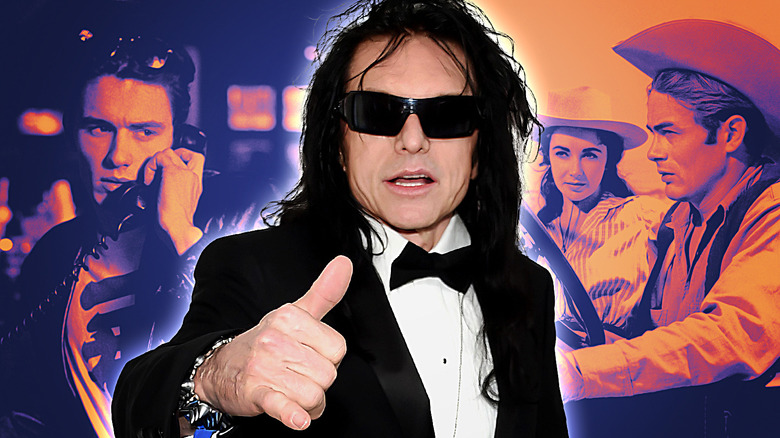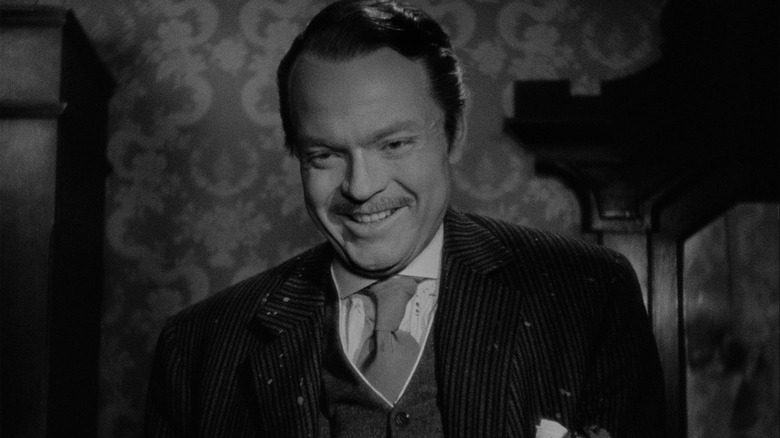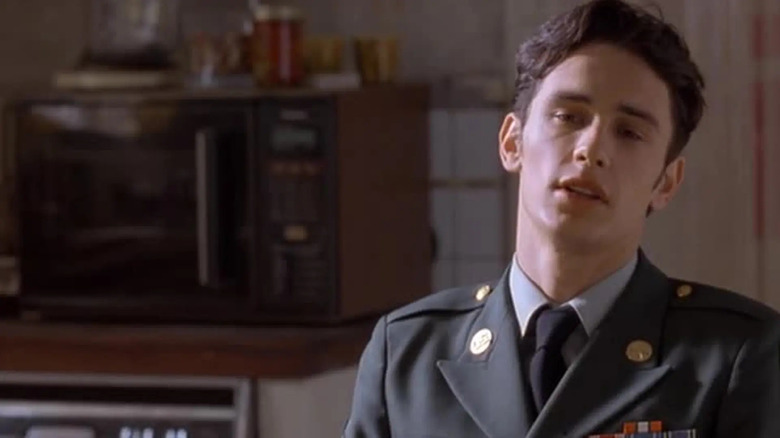Tommy Wiseau's Favorite Movies Of All Time Are Nothing Like We Expected
Those who were driving through the intersection of Highland and Fountain in Los Angeles in the early 2000s got to know Tommy Wiseau very, very well. It was at that intersection that Wiseau chose to buy a billboard for his then-new film "The Room," and it featured a rather unflattering closeup of the man, staring directly into the camera, one of his eyes half-closed. The billboard stayed up for five straight years, costing Wiseau $5,000 a month.
It worked, though. Enough Angelenos drove past the billboard to become curious about "The Room" and seek out a screening at the Sunset 5 theater nearby. Those who saw it in those early days were utterly baffled. "The Room" is an intense infidelity drama about an all-around good guy named Johnny (Wiseau) whose fiancée Lisa (Juliette Danielle) instigates an affair with Johnny's best friend Mark (Greg Sestero). The film, however, is so weirdly scripted and badly filmed (all by Wiseau) that it mutated into cult fodder pretty quickly. The phenomenon of "The Room" grew and grew, eventually leaving L.A. and screening at pop culture conventions and on the midnight movie circuit. Wiseau himself would come to the screenings to take questions from fans and he was aggressively odd, giving weird answers and being evasive about his past. Who was this guy? Wiseau became a legitimate pop culture footnote.
More recently, the film became the subject of a memoir by Sestero, called "The Disaster Artist," which was adapted into a movie starring James Franco as Tommy. By then, the phenomenon had drawn to a close. The mysteries of "The Room" felt like they had been solved.
In 2017, Wiseau was interviewed by Rotten Tomatoes and was asked to list his five favorite movies of all time. Given how indecipherable "The Room" is, however, it's almost impossible to see what films Wiseau might have been inspired by. It seems that Wiseau has a penchant for the classics.
Tommy Wiseau loves the classics
At the top of Wiseau's list is Orson Welles' 1941 "great man" drama "Citizen Kane," often called one of the best movies of all time. "Kane," for any neophytes, tells the posthumous story of the late Charles Foster Kane (Welles), a millionaire newspaper mogul modeled on William Randolph Hearst. Kane's final word was "Rosebud," and an enterprising reporter interviews all his old associates to figure out what it means. He finds that most of his old associates hate him and that Kane sold his soul to achieve massive wealth ... and incurable loneliness. Rich people are all sad and pathetic losers without any connection to real humanity. It's almost a cliché to declare "Citizen Kane" to be your favorite movie, and the choice seems wholly uninspired. Even people who don't watch movies could say that the best movie of all time is "Citizen Kane" and still be correct.
Second on Wiseau's list is George Stevens' epically long intergenerational industry drama "Giant" from 1956. Starring Rock Hudson and Elizabeth Taylor, "Giant" tells the story of a wealthy rancher, his wife, and the rival ranch hand (James Dean) who works for them. The story follows the ranch as it becomes the site of an oil gush and Hudson and Taylor have kids who grow up to have their own dreams and ambitions. The film also addresses systemic racism, as the Hudson character doesn't treat his Mexican workers very well. His son, however, marries a Mexican woman.
Wiseau also selected "Casablanca," Michael Curtiz's 1942 classic about a rest-stop town in Morocco where many people passed through on their way to America, fleeing Europe's Nazi occupation during WWII. "Casablanca" is unassailable, and, like "Citizen Kane," is mentioned every single time lists of The Best are compiled. Of course, Wiseau likes "Casablanca." Everyone likes "Casablanca." "Casablanca" is great.
Also ... Sonny?
Wiseau, perhaps surprisingly, also listed the 2002 drama "Sonny," directed by Nicolas Cage, as one of his favorites. The film stars James Franco who, as mentioned, played Tommy Wiseau in the film adaptation of "The Disaster Artist." It seems that Wiseau loved Franco's performance in "Sonny" and that the film really stayed with him. As he recalled:
"[W]e had a conversation with James, and with Greg [Sestero]. And Greg, long story short, he said, 'What about James?' I said, 'Yeah, he's good, because I like his movie 'Sonny.” 'Sonny' is the movie directed by Nicolas Cage. I don't know if you're familiar with it or not. It's about gigolo in New Orleans, Louisiana, etc."
Wiseau also pointed out that "Sonny" wasn't terribly well-liked when it first came out, earning a mere 21% approval rating on Rotten Tomatoes. He felt, though, that the initial response to a movie cannot be trusted — something he learned from the steady swell of affection for his own movie.
Fifth, Wiseau listed Elia Kazan's 1951 adaptation of "A Streetcar Named Desire," which might be seen as the spiritual precursor to "The Room." In his own words:
"'A Streetcar Named Desire' with Marlon Brando. I just want to put there. All these movies that I've listed, including 'Casablanca,' you have flavors, which I like it. Drama. Comedy. And again, we may argue back and forth about what is drama, what is a comedy, right? What is melodrama? 'The Room' never did melodrama."
There was some insight into the making of "The Room" in a documentary film called "A Room Full of Spoons," but Wiseau sued to keep it from being released. He returned to directing in 2021 to make "Big Shark," a film about a big shark. That film, however, doesn't yet have the same following as "The Room" once did.


